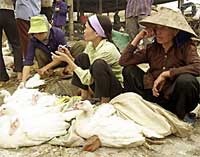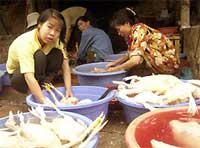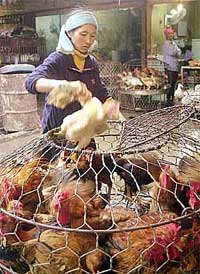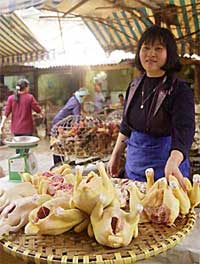In early November, despite the looming threat of avian influenza, many local residents remain surprisingly complacent.
The sale and consumption of unregulated chickens and ducks continue to occur openly. Meanwhile, local authorities seem to be quite lenient…
Soc Trang: Chickens and Ducks Sold Everywhere
 On November 1, we visited Tra Quit Market (Thuan Hoa Commune, My Tu District), and early in the morning, several women were selling chickens and ducks by the Thuận Hòa River. Inside the market, there were over five stalls selling ducks, with more than 200 birds sprawled out onto the walkway or next to the meat, fish, and vegetable stands.
On November 1, we visited Tra Quit Market (Thuan Hoa Commune, My Tu District), and early in the morning, several women were selling chickens and ducks by the Thuận Hòa River. Inside the market, there were over five stalls selling ducks, with more than 200 birds sprawled out onto the walkway or next to the meat, fish, and vegetable stands.
At the stall owned by sister Bay (located at the end of the market), I inquired about purchasing 30 kg of ducks and requested health inspection papers for provincial shipping. Sister Bay responded: “If you buy a few dozen, no paperwork is needed to take them out of the province. If you want to buy in bulk, I can arrange the paperwork for any quantity.”
Heading towards Can Tho, we stopped at Dai Hai Market (Ke Sach District). Although there were no ducks being sold inside the market, upon hearing we were looking to buy ducks, a woman in her 40s quickly marketed her services: “I can provide as many as you want. Just make a deposit of 100,000 VND and give an additional 20,000 VND for the health inspection papers.”
Also at Dai Hai Market, a fish vendor introduced us to Mrs. Phen at Cong Doi Market, claiming she had delicious and… disease-free ducks. When we met her, Mrs. Phen confidently stated: “I have many types of ducks, including wild ducks, Muscovy ducks, and chickens. Each day I sell about 400 birds to various places inside and outside the province.” Afterward, she asked for a 50,000 VND advance to provide me with health inspection documents and noted on the receipt: “If there are no health inspection papers, you will get your 50,000 VND back.”
At Lai Hoa Market in Vinh Chau District, which borders Soc Trang and Bac Lieu provinces, chickens and ducks continue to be sold abundantly by poultry traders. This scene of “carefree” trading persists right under the noses of local authorities.
Kien Giang: Carefree Amidst Avian Influenza
 Mr. Dinh Cong Than, head of the Kien Giang Animal Health Department, reported that the province had organized a successful first round of poultry vaccinations, with 2.5 million birds vaccinated. However, they are currently facing challenges due to the public’s reluctance to vaccinate poultry, especially since many households let their ducks roam freely, making vaccination difficult.
Mr. Dinh Cong Than, head of the Kien Giang Animal Health Department, reported that the province had organized a successful first round of poultry vaccinations, with 2.5 million birds vaccinated. However, they are currently facing challenges due to the public’s reluctance to vaccinate poultry, especially since many households let their ducks roam freely, making vaccination difficult.
It can be said that residents are not very concerned about the risks of a potential avian influenza outbreak, which is frequently warned about in the media. Walking through wholesale markets in Chau Thanh, Rach Soi, and the agricultural market in Rach Gia city, we observed that poultry is still being slaughtered and sold quite “carefreely.” Not only are they being sold, but people also live alongside chickens and ducks.
When we inquired about vaccinations and animal health inspections, a duck seller at Minh Luong Market (Chau Thanh District) casually remarked: “We buy chickens and ducks from the public; if the chickens are healthy, there’s no need for vaccinations or inspections. If there’s an outbreak, we can vaccinate then; it’s not too late.”
Bac Giang: Neglecting Health Inspections
On November 1, we visited several poultry trading locations in Bac Giang city and nearby districts. It was apparent that the activities of buying, slaughtering, and transporting poultry were continuing as usual, seemingly unaffected by warnings of a potential avian influenza outbreak.
 At Thuong Market, Cau Chui Market, and Thiet Market, cages of chickens, ducks, pigeons, and quails were lined up next to each other, creating long rows filled with bustling buyers and sellers. Customers could pick whichever bird they liked, and sellers would even slaughter the poultry right there at the market.
At Thuong Market, Cau Chui Market, and Thiet Market, cages of chickens, ducks, pigeons, and quails were lined up next to each other, creating long rows filled with bustling buyers and sellers. Customers could pick whichever bird they liked, and sellers would even slaughter the poultry right there at the market.
Feathers and waste were thrown directly into the drainage ditches beside the poultry stalls. Behind each cage were a myriad of tools, such as buckets, basins for water, baskets, and bowls for collecting blood, yet there was absolutely no protective gear for those handling the poultry.
Currently, in Bac Giang City, the stalls selling duck blood pudding remain popular among customers, despite health warnings against consuming it due to the high risk of spreading avian influenza to humans. In the areas selling chicken and duck meat, there were no health inspection stamps as required by veterinary authorities.
Quang Ninh: Free Trade of Wild Birds
Despite relatively strict controls by Quang Ninh’s authorities, illegal imports of cattle and poultry across the border at Mong Cai have decreased. However, the hunting and trading of wild birds (which pose a high risk of avian influenza transmission) remain largely unchecked.
It was not difficult to catch a glimpse of wildlife trade; after sitting near the entrance of Market 3 for about two hours, we spotted a bird trader unloading two sacks of seagulls for various vendors at Market 3. Manh, 34, from Hoang Tan Commune (Yen Hung), stated he brings about 50-70 kg of wild birds to Mong Cai each day. According to Manh, wild birds are in demand in Mong Cai due to Chinese tourists.
Mr. Do The Hung, head of the Mong Cai Veterinary Station, listened carefully as we reported the wild bird trading at Market 3 and the transportation of wild birds from inland districts to the border areas. Mr. Hung looked at the digital camera to review photos of wild birds for sale at Market 3 and then turned to us, surprised: “Oh, is that really happening? I will have my team check it out!”
TRAN DUC – NGOC DIEN – H.T.DUNG – HUNG ANH – DO HUU LUC
Hanoi: 1 Suspected H5N1 Case On November 1, a patient named N.M.T., 25 years old, from Dong Da District, was hospitalized with severe breathing difficulties and a sensation of tightness in the neck area. X-ray results indicated a large pneumothorax on the right side and lung damage on both sides; the fever was low (37.3 degrees Celsius) with symptoms matching avian influenza. The patient’s mother reported that five days prior, she had bought pre-prepared chicken from the market for the family of four, and only Ms. T. fell ill. Two days later she recovered, but on the morning of November 1, she experienced chest tightness and difficulty breathing, requiring hospitalization. Yesterday afternoon (November 2), Bach Mai Hospital sent Ms. T.’s samples to the Central Institute of Hygiene and Epidemiology for H5N1 testing. NG.HA Ho Chi Minh City: Tran Chanh Chieu Market Still Operating
As the inspection team arrived at the market, many chicken sellers hurriedly gathered their baskets and ducked into alleys, some even tossed their baskets of chickens and ducks into their homes to hide them. Notably, at 1 Phu Huu, a seller quickly locked the door when the inspection team arrived. Q.KHAI Long An: Mass Duck Deaths Due to… Cholera On the afternoon of November 2, Mr. Dinh Van The, acting head of the Animal Health Department, reported that the veterinary department had confirmed two flocks of over 2,000 ducks that had died en masse in Hamlet 4, Hoa Phu Commune, Chau Thanh District (Tuoi Tre, November 2). The cause was identified as cholera, not H5 avian influenza. In Long An, there are quite a few interprovincial and cross-border duck flocks that have died due to not being vaccinated against cholera. Specifically, the flock of ducks in Hamlet 3, Vinh Cong Commune died from E.coli infection. V.TR. Tien Giang: Ban on Sale of Processed Poultry at Markets from November 15 On November 2nd, the Provincial Steering Committee for Avian and Livestock Disease Control in Tien Giang convened an urgent meeting to implement measures against disease outbreaks following the directive issued by the Prime Minister on November 1st. Mr. Nguyen Van Khang, deputy head of the committee, announced that starting from November 15th, the breeding and sale of processed poultry meat will be prohibited in the two major centers of the province, namely My Tho City and Go Cong Town. Live poultry that passes quarantine will be sold at designated points and must be processed at centralized slaughterhouses. VAN TRUONG |










































 On the afternoon of November 2, 2005, an inter-agency inspection team from District 5, including veterinary officials, market management, and the local People’s Committee, conducted inspections and confiscated 71 live chickens and ducks of unknown origin at mobile trading points in the Tran Chanh Chieu Market area (District 5).
On the afternoon of November 2, 2005, an inter-agency inspection team from District 5, including veterinary officials, market management, and the local People’s Committee, conducted inspections and confiscated 71 live chickens and ducks of unknown origin at mobile trading points in the Tran Chanh Chieu Market area (District 5).









